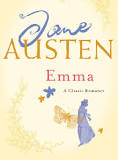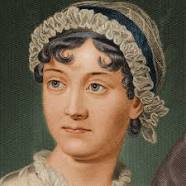Emma Page #27
Emma, by Jane Austen, is a novel about youthful hubris and the perils of misconstrued romance. The story takes place in the fictional village of Highbury and the surrounding estates of Hartfield, Randalls, and Donwell Abbey and involves the relationships among individuals in those locations consisting of "3 or 4 families in a country village". The novel was first published in December 1815 while the author was alive, with its title page listing a publication date of 1816. As in her other novels, Austen explores the concerns and difficulties of genteel women living in Georgian–Regency England; she also creates a lively comedy of manners among her characters and depicts issues of marriage, gender, age, and social status.
“I am sorry to hear you say so, sir; but I assure you, excepting those little nervous head-aches and palpitations which I am never entirely free from anywhere, I am quite well myself; and if the children were rather pale before they went to bed, it was only because they were a little more tired than usual, from their journey and the happiness of coming. I hope you will think better of their looks to-morrow; for I assure you Mr. Wingfield told me, that he did not believe he had ever sent us off altogether, in such good case. I trust, at least, that you do not think Mr. Knightley looking ill,” turning her eyes with affectionate anxiety towards her husband. “Middling, my dear; I cannot compliment you. I think Mr. John Knightley very far from looking well.” “What is the matter, sir?--Did you speak to me?” cried Mr. John Knightley, hearing his own name. “I am sorry to find, my love, that my father does not think you looking well--but I hope it is only from being a little fatigued. I could have wished, however, as you know, that you had seen Mr. Wingfield before you left home.” “My dear Isabella,”--exclaimed he hastily--“pray do not concern yourself about my looks. Be satisfied with doctoring and coddling yourself and the children, and let me look as I chuse.” “I did not thoroughly understand what you were telling your brother,” cried Emma, “about your friend Mr. Graham's intending to have a bailiff from Scotland, to look after his new estate. What will it answer? Will not the old prejudice be too strong?” And she talked in this way so long and successfully that, when forced to give her attention again to her father and sister, she had nothing worse to hear than Isabella's kind inquiry after Jane Fairfax; and Jane Fairfax, though no great favourite with her in general, she was at that moment very happy to assist in praising. “That sweet, amiable Jane Fairfax!” said Mrs. John Knightley.--“It is so long since I have seen her, except now and then for a moment accidentally in town! What happiness it must be to her good old grandmother and excellent aunt, when she comes to visit them! I always regret excessively on dear Emma's account that she cannot be more at Highbury; but now their daughter is married, I suppose Colonel and Mrs. Campbell will not be able to part with her at all. She would be such a delightful companion for Emma.” Mr. Woodhouse agreed to it all, but added, “Our little friend Harriet Smith, however, is just such another pretty kind of young person. You will like Harriet. Emma could not have a better companion than Harriet.” “I am most happy to hear it--but only Jane Fairfax one knows to be so very accomplished and superior!--and exactly Emma's age.” This topic was discussed very happily, and others succeeded of similar moment, and passed away with similar harmony; but the evening did not close without a little return of agitation. The gruel came and supplied a great deal to be said--much praise and many comments--undoubting decision of its wholesomeness for every constitution, and pretty severe Philippics upon the many houses where it was never met with tolerably;--but, unfortunately, among the failures which the daughter had to instance, the most recent, and therefore most prominent, was in her own cook at South End, a young woman hired for the time, who never had been able to understand what she meant by a basin of nice smooth gruel, thin, but not too thin. Often as she had wished for and ordered it, she had never been able to get any thing tolerable. Here was a dangerous opening. “Ah!” said Mr. Woodhouse, shaking his head and fixing his eyes on her with tender concern.--The ejaculation in Emma's ear expressed, “Ah! there is no end of the sad consequences of your going to South End. It does not bear talking of.” And for a little while she hoped he would not talk of it, and that a silent rumination might suffice to restore him to the relish of his own smooth gruel. After an interval of some minutes, however, he began with, “I shall always be very sorry that you went to the sea this autumn, instead of coming here.” “But why should you be sorry, sir?--I assure you, it did the children a great deal of good.” “And, moreover, if you must go to the sea, it had better not have been to South End. South End is an unhealthy place. Perry was surprized to hear you had fixed upon South End.” “I know there is such an idea with many people, but indeed it is quite a mistake, sir.--We all had our health perfectly well there, never found the least inconvenience from the mud; and Mr. Wingfield says it is entirely a mistake to suppose the place unhealthy; and I am sure he may be depended on, for he thoroughly understands the nature of the air, and his own brother and family have been there repeatedly.” “You should have gone to Cromer, my dear, if you went anywhere.--Perry was a week at Cromer once, and he holds it to be the best of all the sea-bathing places. A fine open sea, he says, and very pure air. And, by what I understand, you might have had lodgings there quite away from the sea--a quarter of a mile off--very comfortable. You should have consulted Perry.” “But, my dear sir, the difference of the journey;--only consider how great it would have been.--An hundred miles, perhaps, instead of forty.” “Ah! my dear, as Perry says, where health is at stake, nothing else should be considered; and if one is to travel, there is not much to chuse between forty miles and an hundred.--Better not move at all, better stay in London altogether than travel forty miles to get into a worse air. This is just what Perry said. It seemed to him a very ill-judged measure.” Emma's attempts to stop her father had been vain; and when he had reached such a point as this, she could not wonder at her brother-in-law's breaking out. “Mr. Perry,” said he, in a voice of very strong displeasure, “would do as well to keep his opinion till it is asked for. Why does he make it any business of his, to wonder at what I do?--at my taking my family to one part of the coast or another?--I may be allowed, I hope, the use of my judgment as well as Mr. Perry.--I want his directions no more than his drugs.” He paused--and growing cooler in a moment, added, with only sarcastic dryness, “If Mr. Perry can tell me how to convey a wife and five children a distance of an hundred and thirty miles with no greater expense or inconvenience than a distance of forty, I should be as willing to prefer Cromer to South End as he could himself.” “True, true,” cried Mr. Knightley, with most ready interposition--“very true. That's a consideration indeed.--But John, as to what I was telling you of my idea of moving the path to Langham, of turning it more to the right that it may not cut through the home meadows, I cannot conceive any difficulty. I should not attempt it, if it were to be the means of inconvenience to the Highbury people, but if you call to mind exactly the present line of the path.... The only way of proving it, however, will be to turn to our maps. I shall see you at the Abbey to-morrow morning I hope, and then we will look them over, and you shall give me your opinion.”
Translation
Translate and read this book in other languages:
Select another language:
- - Select -
- 简体中文 (Chinese - Simplified)
- 繁體中文 (Chinese - Traditional)
- Español (Spanish)
- Esperanto (Esperanto)
- 日本語 (Japanese)
- Português (Portuguese)
- Deutsch (German)
- العربية (Arabic)
- Français (French)
- Русский (Russian)
- ಕನ್ನಡ (Kannada)
- 한국어 (Korean)
- עברית (Hebrew)
- Gaeilge (Irish)
- Українська (Ukrainian)
- اردو (Urdu)
- Magyar (Hungarian)
- मानक हिन्दी (Hindi)
- Indonesia (Indonesian)
- Italiano (Italian)
- தமிழ் (Tamil)
- Türkçe (Turkish)
- తెలుగు (Telugu)
- ภาษาไทย (Thai)
- Tiếng Việt (Vietnamese)
- Čeština (Czech)
- Polski (Polish)
- Bahasa Indonesia (Indonesian)
- Românește (Romanian)
- Nederlands (Dutch)
- Ελληνικά (Greek)
- Latinum (Latin)
- Svenska (Swedish)
- Dansk (Danish)
- Suomi (Finnish)
- فارسی (Persian)
- ייִדיש (Yiddish)
- հայերեն (Armenian)
- Norsk (Norwegian)
- English (English)
Citation
Use the citation below to add this book to your bibliography:
Style:MLAChicagoAPA
"Emma Books." Literature.com. STANDS4 LLC, 2025. Web. 9 Jan. 2025. <https://www.literature.com/book/emma_29>.




Discuss this Emma book with the community:
Report Comment
We're doing our best to make sure our content is useful, accurate and safe.
If by any chance you spot an inappropriate comment while navigating through our website please use this form to let us know, and we'll take care of it shortly.
Attachment
You need to be logged in to favorite.
Log In